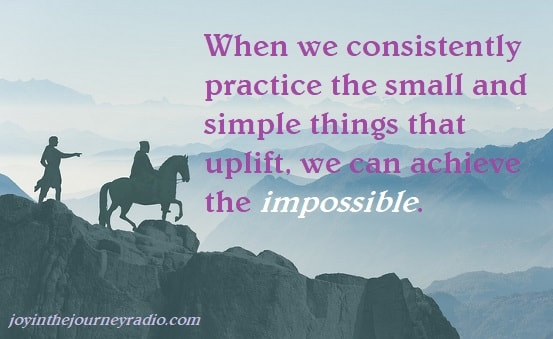Yet the Prophet’s remarks weren’t the only ones which inspired and impressed themselves upon me. President Dallin H. Oaks’s address entitled “Small and Simple Things” reminded me of the great power of small actions performed consistently over time. To be clear, I’ve always liked President Oaks. His logical approach to addressing any question has always resonated with me. And he’s been a real champion for LDS singles. Some of the most classic discourses for singles have come from him. Considering that admiration, I’m always impressed with his remarks. But something was different for me this around. As President Oaks spoke, I felt an urgent need to consider what small and simple things I have in my life. Ask the questions  President Oaks began by sharing two photographs each showing a tree with a root that had slowly grown underneath an adjacent sidewalk and cracked it. He observed that “the thrusting power that cracked these heavy concrete sidewalks was too small to measure on a daily or even a monthly basis, but its effect over time was incredibly powerful.” President Oaks then mentioned many of the small and simple things that can uplift us (like prayer, scripture study, and repentance) as well as those small and simple things that can hold us back. He of course mentioned the Word of Wisdom and pornography in this regard. But I remain impressed with the other areas he included in his cautions:
For good or ill, those small and simple things we embrace consistently will shape us into who we become. President Oaks quoted Brigham Young when speaking on this point.
All this begs questions for each of us. What small and simple things do I have in my life? Will they lead me where I want to go? And what ones should I have to help me achieve my goals and dreams? Consider the time  Whatever we decide to incorporate into our lives will have little if any effect if we don’t perform it consistently. The half-hearted, occasional, or sporadic effort won’t produce change. Consistency is the key that unlocks success. What really struck me about President Oaks’s remarks is his holistic perspective. Of course he mentioned the small and simple things we’d expect, like prayer and scripture study. But he also talked about other things, like how we spend our time. So many of us spend so much time in consumption. We constantly seek to be entertained. We often think more about how we can satisfy our own desires than how we can help someone else. Please don’t get me wrong. I’m not saying we shouldn’t have a good time and enjoy ourselves. I’m just saying we shouldn’t be spending so much time consuming at the expense of time producing. Excess consumption practiced consistently will not make you any better, nor will it improve anyone else’s life. And if no one’s life is better because of how you spent your time, how can that not be considered a waste of time? Embrace your daily practice  Many of President Oaks’s examples of small and simple things describe our environment. And indeed, much of our environment we make with what we choose. Lately I’ve been discovering the choices I make in the first and last hours of the day largely determine my environment during the day. There’s nothing hugely momentous that I practice in either of these hours. I of course have prayer and scripture study but also embrace exercise, reading, language study, and meditation. Taken together, my daily practices form only about 8% of my day. But I’m starting to feel effects growing within me from my consistency in performing these small and simple acts every day, including increased confidence, increased desire to work, greater feelings of gratitude and abundance, and of course less distance between myself and my Heavenly Father. What small and simple things do you have in your life? Are they helping you to become everything you’re capable of becoming? Or are they preventing you from improving? The Lord has said, “Out of small things proceedeth that which is great” (D&C 64:33). When we consistently practice the small and simple things that uplift, we can achieve the impossible. And that will bring us more joy in our journey.
0 Comments
 Sooner or later, everyone encounters hard times. It’s called mortality, and it’s part of the reason why we’re here. Overcoming challenges allows us to learn in ways we could not otherwise learn and to become what we otherwise could not become. If we focus too much on our challenges, however, we can easily succumb to feelings of overwhelm and discouragement, even despair. Some people escape their doldrums by remembering that there is always someone who is worse off than they are. For some LDS singles who have struggled for years without promised blessings, it may seem difficult to believe that anyone has had it worse than they do. And yet there are those who have had it worse. The scriptures provide an excellent example in Abraham. When you come to realize how much worse he had it, you can find the courage and resiliency to keep walking by faith. After all, most of us can’t touch Abraham’s experience. The challenges  By the standards of any age in world history, Abraham had a challenging life. He was once placed on an altar to be sacrificed, only to have an angel save him. He was constantly on the move, and in one of those places to which he moved, his brother died. He had to deal with apostasy in his father, a problem since he longed to have what his father’s ancestors had — priesthood authority passed down from father to son. Having a father who continually returned to idol worship didn’t really help much in that respect. And yet, like life for all of us, it wasn’t all bad. He obtained priesthood authority from someone more righteous and more advanced in years than his father. He grew to become a rather wealthy man, leading a house with many servants. And somewhere in that mix he married Sarah, a wife he dearly loved. But try as they might, infertility entered and would not leave. Whatever hopes Abraham had for a son to inherit from him must have slowly faded as the years went by one after the other with no change anywhere in sight. It’s understandable why Abraham fathered a son through Hagar, one of Sarah’s handmaidens. It seemed to be the only way to produce an heir. The promise  Then came the Lord’s promise. After so many years of wanting and not having, Abraham received a promise from the Lord that he would have a son through his wife Sarah. He was 62 years old. His wife Sarah was ten years his junior, so it’s no surprise that she laughed at the thought of giving birth to a son. Abraham also had his doubts. Those doubts would continue as they each got older. It was during this time that Abraham had a son through Hagar. What seemed incredible when the promise was made seemed even more so with each year passing thereafter. But the Lord reaffirmed His promise would be fulfilled. And we all know how the story ends. Sarah did give birth to Abraham’s son Isaac. Sarah was ninety years old. Abraham had lived a full century. The faith  I’m not suggesting that we need to live a full century before we see the fulfillment of the promises the Lord has made to each of us. Instead, I’m suggesting we live in faith, faith born from reflecting on Abraham’s position relative to our own. Abraham was 62 years old when he first received the promise of a son and 100 years old when that promise was fulfilled. That means he had to wait 38 years for the fulfillment of the Lord’s promise to him. That’s a long time to wait. And I’m willing to wager (though I’m not a betting man) that most of us waiting for the fulfillment of our own blessings have a ways to go before we can touch Abraham territory. I myself have been single for more than two decades. As long as that has been to endure, it’s only about half of what Abraham endured. Clearly, I can’t touch this. Most LDS singles are in that same boat. As long as you’ve each waited for the fulfillment of your desired blessings, you haven’t waited anywhere near as long as Abraham had to wait. So you can’t touch this either. The Lord pulled through for Abraham. He’ll pull through for each of us. As we continue to walk in faith that all of His promises will be fulfilled, He will send us many tender mercies to support us. We can feel the confidence that we will receive our promised blessings. And that will bring us more joy in our journey.
 Have you ever wondered why God’s plan is called the plan of happiness when so many LDS singles just aren’t happy? Some would say that’s because they’re single. After all (goes the reasoning), you need to be married to follow the plan. Some might cry, “But that’s not my fault! I’m keeping the standards!” To these singles, adherents of the you-have-to-be-married perspective usually respond, “Sorry, but that’s not the plan. In order to be happy, you need to be married and raise a family.” These answers fail to satisfy many LDS singles. They easily despair many who never married at ever feeling accepted with their subculture. The divorced can encounter a discouragement of their own. Once “accepted,” now they find themselves “unaccepted” because now they aren’t following “the plan” anymore. And they aren’t alone; the widowed can experience their own identity crisis. But plenty of unhappy married people live in this world, proving marriage alone won’t make you happy. Is following the plan of happiness really the only way to be happy? Follow the right plan  First, we need to clarify what plan we’re talking about. Within LDS subculture, some things exist because they’re essential parts of the gospel, and others exist because they’re cultural traditions that bear some relation to the gospel but aren’t essential parts of it. That means there’s more then one “plan.” We all know the plan our subculture hands us. After high school, you serve a mission, go to college, get a job, and somewhere in that mix get married. Plenty of people who follow this plan are happy, but not every follower of this plan is. If you’re one of these unhappy individuals, you can easily think you need to follow the plan to be happy. But are you even following the right plan? Yes, God wants you to serve a mission if that’s right for you. But missions aren’t for everyone. And college isn’t right for everyone either. You might do better going to a trade school or learning skills in the School of Hard Knocks. You can follow this line of thinking for the remainder of the life plan our LDS subculture provides. Many of the milestones in this plan aren’t essential to the gospel. Rather, they exist because our traditions have made them essential to our culture. Get individualized  What about marriage and family life? Marriage and family help us to grow in ways we can’t otherwise. They help us become what we otherwise couldn’t. That’s at least partly why marriage and family are part of God’s plan of happiness. How could we be truly happy if we couldn’t reach our potential? And generally, you should encounter these milestones when you’re young. But the exact timing will be different for everyone. God’s plan of happiness is not that we check set items off a list as soon as possible. God’s plan of happiness is that we do what’s right for us when it’s right for us. That truth reveals the nature of happiness itself. Happiness — not the emotion or feeling but the state of being — comes from giving your all to what’s right for you. Timing contributes greatly to what’s right; nothing can be truly right when the time isn’t. Because not everything is right for everyone at the same time, God’s plan of happiness is in actuality individualized. It contains some general features that apply to all. But the details depend greatly on the individual. Partner with the Lord That’s why you need to counsel with the Lord to know if you’re following God’s plan of happiness. And only you and those with stewardship over you can know that. Only by revelation can you or anyone else know what’s truly right for you. You can’t be happy without that revelation. How can you give your all to what’s right for you unless you first know what’s right for you? And how can you know what’s right for you except it’s revealed to you? And how can you get that revelation unless it falls within the bounds of your stewardship? That’s why you need that revelation about what’s right for you and why only you and those with stewardship over you can know what’s right for you. You can be happy without following the life plan our LDS culture provides. But you can’t be happy without following God’s plan of happiness for you. Correctly understood, it’s the only way you can be happy. When you partner with the Lord, you can know what’s right for you. When you know what’s right for you, you can give your all to those right things. And when you do that, you will be truly happy. And that will bring you more joy in your journey.
 If you’re struggling with LDS singles life, and particularly with dating, then you need to examine your attitude and your approach. Your results in life always come from what you do. And what you do inside yourself (your attitude) and outside yourself (your approach) comes from your choices. We’re all choosing the life we want. Many LDS singles without the life they want need to adjust both attitude and approach. We touched on some aspects of a more effective approach two weeks ago when we discussed the proper role of revelation in dating. Then last week we addressed aspects of a more effective attitude. Neither of these discussions was comprehensive, but they do contain good starting points for positive change. Here’s another aspect of both attitude and approach: Many LDS singles make assumptions about their world which their habits then use as the basis for action. But it’s like the old saying goes — garbage in, garbage out. A more effective attitude and approach begins with more effective assumptions. Everything goes back to the way you think. That’s why a periodic reformat and reboot is good; you need to step back, examine your assumptions, and clear your head of anything faulty or less effective. Question your assumptions  Sometimes what we think is significant really isn’t. Many LDS singles reject opportunities for success because their assumptions about what was important or even essential guided them along a different path. Their assumptions blinded them into thinking what really was an opportunity wasn’t an opportunity. For example, most singles think the age of their special someone is within 5-6 years of their own. Why? Because they assume that’s what they should want. But often it’s not experience guiding them to adopt that assumption; they’re just being good “sheeple” in following the herd. Thankfully, President Hinckley’s parents didn’t follow that assumption. They were separated by 13 years of age. And their union produced a prophet! Life will never fully unfold for you until you start questioning your assumptions. When you let go of what you think you need but really don’t, you open yourself to more possibility. And that increases your probability of achieving success. Don’t discount the good  Many LDS singles interact with other singles only insofar as it serves their agenda. Once someone no longer serves their agenda, they cease all interactions with that someone. This faulty approach is itself based on faulty assumptions: Spending time and money on people who won’t progress with you towards marriage is a waste. That assumes people matter only insomuch as they help you achieve what you want. In the end, all that really matters is getting the goal. When you spell it out, it’s not hard to see how ridiculous those assumptions are. People have inherent worth as children of God. Everyone matters. Yet many of us don’t have the self-awareness necessary to realize how ridiculous our own assumptions are. Yes, lovers should be friends first. But friendship alone has intrinsic value. Who couldn’t use more support in facing the challenges of LDS singles life? Every relationship you have, romantic and otherwise, offers knowledge and experience that can help you have a better relationship with that special someone when that person comes into your life. By discounting the good many potential friends have to offer, you make life harder than it needs to be. And you might be staying single longer than needed as well. Look for the flecks  Elder M Russell Ballard once told the story of a young man who went to California during the Gold Rush to seek his fortune. He eagerly panned for gold nuggets like the ones he had heard about before coming west. But after weeks of effort, he had found nothing. Then one day he met an older gentleman who had spent many days prospecting and found enough gold to fill a small bag. The young man was discouraged to learn that gold was not the nuggets for which he searched but rather many tiny flecks. After hearing his discouragement, the older gentleman responded that those flecks had made him a wealthy man. If we assume the eternal companion we seek is a gold nugget, then we may be joining that young man in disappointment. Most people aren’t gold nuggets; they have imperfections aplenty. Yet they also have flecks of gold mingled among those imperfections. Choosing to give those gold flecks more weight than the imperfections can make us wealthy indeed. When you clear your head of faulty assumptions, you can more easily meet with your success. Embracing all experience opens the door of possibility, increases your probability of success, and helps you to find much more than you ever imagined you could. And that will bring you more joy in your journey.
|
Author
Howdy! I'm Lance, host of Joy in the Journey Radio. I've been blogging about LDS singles life since 2012, and since 2018 I've been producing a weekly Internet radio show and podcast to help LDS singles have more joy in their journey and bring all Latter-day Saints together. Let's engage a conversation that will increase the faith of LDS singles and bring singles and marrieds together in a true unity of the faith.
Comment
Joy in the Journey Radio encourages the free discussion of ideas but reserves the right to remove and/or block comments which do not conform to LDS standards.
Donate
Joy in the Journey Radio offers many free resources to help LDS singles everywhere, but it certainly isn't free! Help Joy in the Journey Radio in its mission to improve the lives of LDS singles by donating today.
Posts by Month
December 2022
Categories
All
|





 RSS Feed
RSS Feed